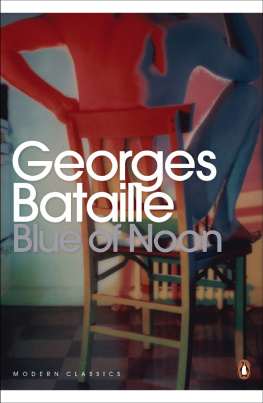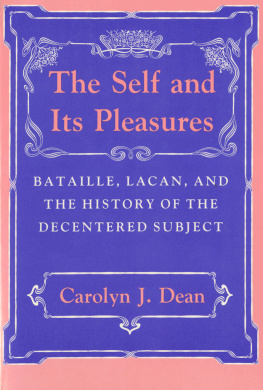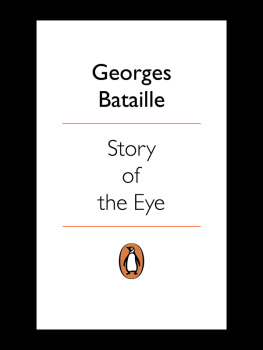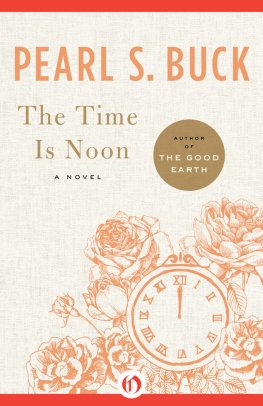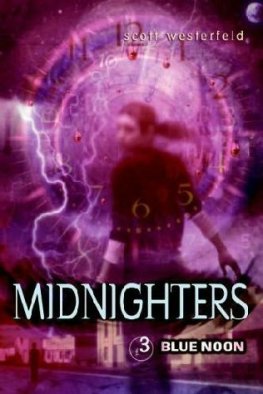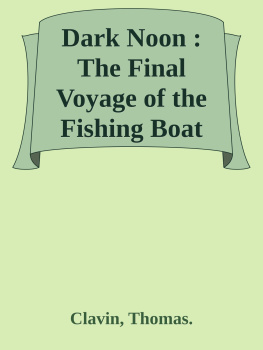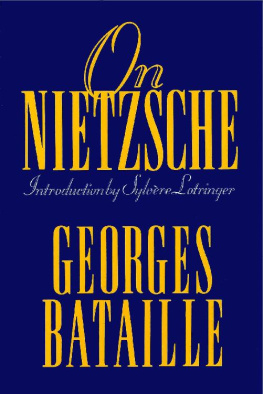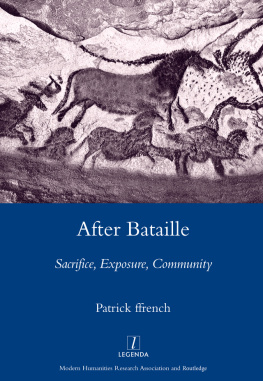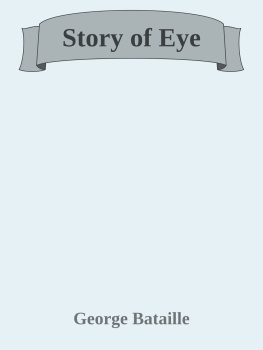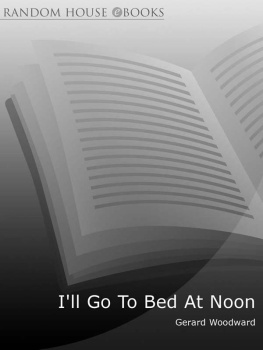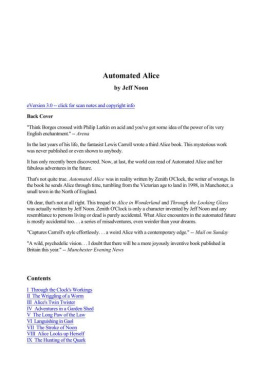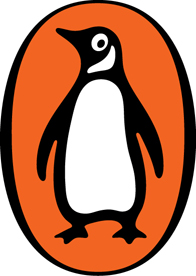PENGUIN CLASSICS
UK | Canada | Ireland | Australia
New Zealand | India | South Africa
Penguin Books is part of the Penguin Random House group of companies whose addresses can be found at global.penguinrandomhouse.com.
Originally published in French as Le Bleu du Ciel 1957
First published in this translation by Marion Boyars Publishers Ltd. 1979
This edition published in Penguin Classics 2012
Copyright Georges Bataille, 1957
Translation copyright Marion Boyars Publishers Ltd., 1979
Introduction copyright Will Self, 2001
Cover: Lucas Samaras Photo-Transformation, January 24, 1974 [detail] Color instant print (Polaroid SX-70) 3 1/8 x 3 1/8" (7.9 x 7.9cm). Lucas Samaras, courtesy The Pace Gallery/2011. Digital image, The Museum of Modern Art, New York/Scala, Florence.
The moral right of the translator and the authors of the Introduction and Afterword have been asserted
All rights reserved
ISBN: 978-0-241-21539-5
THE BEGINNING
Let the conversation begin
Follow the Penguin Twitter.com@penguinukbooks
Keep up-to-date with all our stories YouTube.com/penguinbooks
Pin Penguin Books to your Pinterest
Like Penguin Books on Facebook.com/penguinbooks
Listen to Penguin at SoundCloud.com/penguin-books
Find out more about the author and
discover more stories like this at Penguin.co.uk
PENGUIN MODERN CLASSICS
Blue of Noon
Georges Bataille, French essayist and novelist, was born in 1897. He converted to Catholicism, then to Marxism, and was interested in psychoanalysis and mysticism. As curator of the municipal library in Orleans, he led a relatively simple life, although he became involved, usually on the fringes, with the surrealist movement. He founded the literary review Critique in 1946, which he edited until his death in 1962, and was also a founder of the review Documents, which published many of the leading surrealist writers. His writing is a mixture of poetry and philosophy, fantasy and history, and his first novel, Story of the Eye, was published under the pseudonym of Lord Auch. Batailles other works include the novels LAbb C and My Mother, and the volumes of essays Eroticism and Literature and Evil.
Will Self has earned his reputation through a body of innovative work: theres nobody quite like him writing today. His novels include The Book of Dave and The Butt, and he has also published many books of short stories, novellas and works of non-fiction. His most recent book is Walking to Hollywood. As a journalist he has contributed to a plethora of publications over the years; he is also a regular broadcaster on television and radio. He has four children, and lives in south London.
For Andr Masson
Introduction to the Penguin Edition
It really isnt important how you approach this book. As Bataille says of fiction in general and by extension his own work in particular: How can we linger over books to which their authors have manifestly not been driven? Blue of Noon is a novel that is as driven as a car whose driver has lost control. To read it is to share vicariously in being drunk at the narrative wheel, your foot spasmodically jamming down on the accelerator, while events loom out of the darkness to take on the awful certainty of a disastrous collision.
If you commit yourself to reading Blue of Noon there is no necessity for you to worry about where its all heading because your very assent to the journey means that youre incapable of reading a map. Theres a kind of exhilaration in this and a kind of terror; both of which extreme emotions the author is only too willing to exploit. Yet, much like Troppmann, the disaffected narrator of Blue of Noon, the passage of these awful events, that inexorably lead to a sense of crushing, historical imminence, is none the less accompanied in the reader by a curious sense of immanence. It is as if a cloaca God were to descend to someone who was labouring on the torture throne of constipation, and deliver them a laxative balm.
The scatological trope in this context is not gratuitous. Georges Bataille, born in Billom, Puy-de-Dme, in 1897, was a pivotal figure in those schools of anti-rationalism that did so much to define French culture in the twentieth century. An essayist, a novelist, a philosophical theorist, Bataille threw all of his considerable energies into the rejection of traditional literary structures. He saw the aim of all intellectual, artistic and even religious activity as the transfiguration of the rational individual in an act of ecstatic communion. For Bataille, religious and sexual ecstasy were co-terminous, and he developed a surprisingly systematic and anthropological architectonic in support of this view, most notably in Eroticism.
While well capable of developing his ideas with clarity and intellectual attack, like Nietzsche, his true philosophic progenitor, Bataille was equally content to express himself in obscure and unsatisfying ways. Theres a delirious irony in the fact that, while he was the author of myriad texts, on subjects as diverse as thirteenth-century religious verse and the cave paintings of Lascaux, he remains best known for his pornographic novel Story of the Eye, which he wrote pseudonymously as Lord Auch. This nom de plume derived from the way that an acquaintance of Batailles abbreviated the cry Aux chiottes! (To the shit house!). And its just to say that in as much as the more notorious work rushes its readers to the shit house where sex and death merge in an act of involuntary evacuation, so Blue of Noon to my mind a far more important and significant work rushes its readers into the shitty charnel house which was the Second World War.
Batailles life reduced to its bare bones reads like a textbook curriculum vitae for the thinker he became. His mother was mentally ill, his father died of syphilis. He converted to Catholicism on the eve of the First World War and served for a year before being discharged because of tuberculosis. Like his fellow French anti-rationalist Louis-Ferdinand Cline, Bataille suffered from ill health and attendant depression for the rest of his life; and as with the author of Journey to the End of the Night, Batailles fiction is darkly adumbrated by the hell of the trenches.
In the post-war period Bataille struggled with his Catholic faith, training first as a priest, and then spending some time in a Benedictine monastery on the Isle of Wight. However, the inevitable loss of faith came, and by the early 1920s he was involved with the surrealist movement. Naturally, Bataille was expelled by Andr Breton for his divisiveness (and truly expulsion was the lifeblood of surrealism, a veritable squid of an artistic movement, propelled through the muddy waters of interwar Paris by successive expulsions), and entered a liberating period of psychoanalysis.

